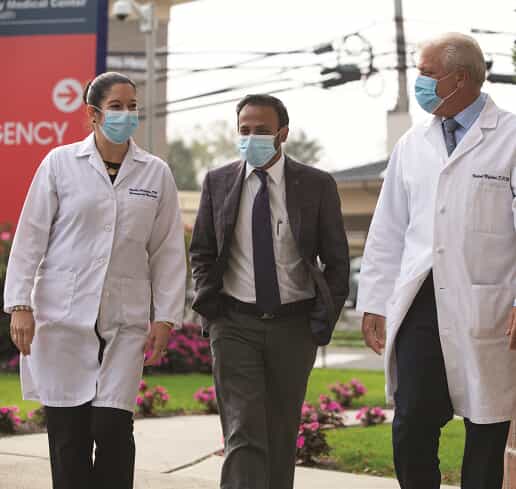Community Medical Center is becoming a teaching hospital, elevating the level of patient care.

When you go to your local hospital for an emergency, surgery or to have a baby, you expect high-quality care. If you choose an academic medical center, you’ll not only receive high-quality care, but you’ll also have access to the latest treatments and tests as well as clinical trials. That’s why Community Medical Center (CMC) has embarked on a journey to become a teaching hospital.
“A teaching program will benefit patients because it will elevate the level of care we provide,” says Patrick Ahearn, Chief Executive Officer at CMC. “All of our health care providers will be working at the top of their game.”
Four years ago, when Ahearn joined CMC, he wanted to determine if there was an appetite among staff members for becoming a teaching hospital.
“You need an environment where health care providers are enthusiastic about teaching, and I felt this was embraced,” he says.
Currently, CMC has a nurse residency program, which helps transition new graduates of registered nursing programs to practice. The hospital also educates pharmacy, social work, nutrition, rehabilitation, and radiology students.
A Plan for Medical Education
In 2019, the hospital began the process of developing the program. Staff members chose specialties based on the patient population, which skews older (about 70 percent are Medicare patients). They chose to focus on emergency medicine, internal medicine, and podiatry, each of which involves three years of training.
The next step was to apply to the Accreditation Council for Graduate Medical Education (ACGME) and demonstrate that CMC had a plan for educating medical students. The hospital had to show that it had a residency program director and a rotation schedule for residents. For instance, emergency medicine residents must spend a certain amount of time in the Emergency Department, trauma, sonography, and toxicology. Internal medicine residents must learn about various subspecialties, including cardiology and gastroenterology. Podiatry residents will learn about elective foot and ankle surgery, reconstructive procedures, and wound care.
The hospital also must have a place for the residents to study, learn and live. It had to create a wellness program for residents and a faculty development program, which shows attending physicians how to teach. CMC’s current physicians are back in the classroom, learning how to teach and train residents in a program conducted by Rutgers Robert Wood Johnson Medical School faculty.
Investing in Community Health
In September, the ACGME approved CMC’s residency program. Residents began having virtual interviews for the residency program in October, and “matching”—in which students and hospitals rank their top choices—will take place in March.
Twelve positions are available for the emergency medicine and internal medicine programs, and three positions are open for the podiatry program.
The goal is to start the program in June. CMC plans to train residents in surgery and obstetrics starting in 2022.
“It will be exciting to watch residents infuse themselves in the collaborative environment of CMC,” says Meika Neblett, MD, Chief Medical Officer. “We’re proud of the medical staff, who have built a great foundation for the residency program. We’re excited to invest in the future medical staff and our community.”
The ultimate goal, of course, is for residents to practice in the community.
“This is a chance for the medical staff to train their future partners and colleagues,” says Neblett.
Patients will benefit from having a teaching hospital close to home. “They deserve access to the best care without having to travel to New York or Philadelphia,” says Ahearn. “We’ll be able to improve the quality of care for the more than 600,000 people who live near the hospital.”
To learn more about residency programs at Community Medical Center, visit Medical Education.